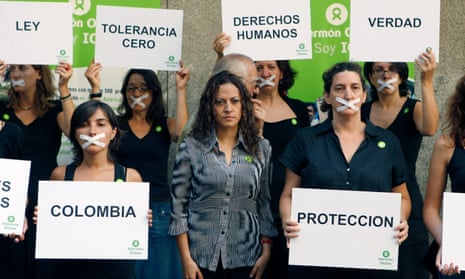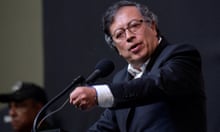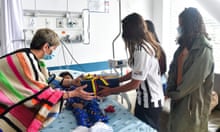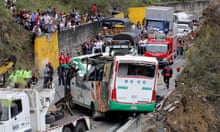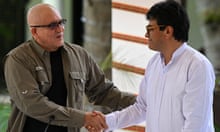Nearly two decades after her ordeal, Jineth Bedoya’s voice still cracks when she describes the day she was brutally attacked while carrying out her job as a reporter in Colombia.
“It’s difficult to understand what happened, all I know is that I wanted to die,” she says.
Bedoya was investigating rightwing paramilitary death squads; on her way to an interview with an imprisoned militia leader in May 2000 she was abducted, drugged, gang-raped and tortured. “It wasn’t an interview, it was a trap,” Bedoya said. “In my head there no timeline because so much was happening that I didn’t even know where I was.”
In May, two of the men who attacked Bedoya were sentenced to decades in prison in a rare victory against impunity, but watchdogs have warned that threats and attacks on Colombian reporters are once again on the rise – particularly in isolated rural areas.
Last year, the Bogotá-based Foundation for Press Freedom (or Flip) documented 477 attacks and threats against journalists, up 53% on 2017; three Colombian journalists were killed, up from one in 2017.
A 2016 peace deal with the leftist rebels of the Revolutionary Armed Forces of Colombia (Farc) was supposed to usher in a peaceful chapter in Colombia, but violence still rages as dissident guerrilla factions and rightwing paramilitaries battle for control of territory once held by Farc.
Activists and social leaders have been targeted at unprecedented levels: 702 have been murdered since the accord was signed, while 135 ex-combatants have also been killed.
Meanwhile, Colombia’s president, Iván Duque, has been accused of undermining the implementation of the accords, attacking the special reconciliatory tribunal it created and its provisions for rural development.
This is against a backdrop of increasingly difficult territory for journalists.
“This is particularly worrying as these are places where armed groups are most present and information is harder to access,” said Flip’s Pedro Vaca. “In Colombia there are few national media outlets, so local reporting becomes more vital, and attacks against one journalist lead to a culture of self-censorship.”
International media have also had their work impeded: the New York Times correspondent Nicholas Casey and photographer Federico Ríos Escobar were forced to leave the country after a revealing a military order that encouraged kill quotas for enemy combatants.
Members of the governing Democratic Centre party attacked Casey on Twitter, with one senator, María Fernanda Cabal, accusing him of having links to the rebels.
When it emerged that respected local weekly Semana also had the scoop but decided not to publish it, one of the magazine’s headline columnists, Daniel Coronell, criticised it in its own pages in late May. He was sacked later that week though later reinstated after a public outcry.

When justice is served, it is painfully slow.
Bedoya was left for dead after the May 2000 attack, but she was eventually forced to undertake her own investigation of the crime after the official inquiry went nowhere.
“The authorities essentially didn’t investigate for years,” Bedoya said. “So after wanting to be alone, after wanting to kill myself, I had to do it myself.”
Nineteen years later, two former paramilitaries, Alejandro Cárdenas Orozco and Jesús Emiro Pereira Rivera, were finally sentenced in May to 40 and 30 years respectively for their roles in the attack. More than two dozen other suspects have not been charged.
“That day people were congratulating me, but I decided to turn off my phone, stay off social media, and I shut myself in my house because I had nothing to celebrate,” Bedoya said.
During the trial, Bedoya was forced to recount her attack in a courtroom – in front of the perpetrators – something she described as “an ordeal as bad as everything else they did”.
“These charges came incredibly late, and they are only the start,” said Vaca. “This ruling would not have been possible without the doggedness, the bravery and the leadership of Jineth Bedoya herself.”
Bedoya maintains that her work is still impeded. “Even today, because I still receive threats, I have to travel with three bodyguards everywhere in an armoured car, and that’s how I have to report,” she said. “What freedom of expression is that?”
Her prognosis for the country is similarly bleak. “Colombia is sliding backwards,” she said.
“When you see social leaders threatened, when you hear women threatened with rape if they don’t shut up, when you see journalists attacked for not toeing the government line, it’s heartbreaking. It shows we are turning our backs on elements of a peace we spent years building.”
